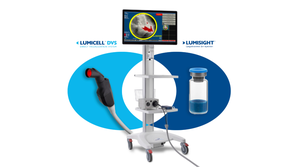With a recent acquisition, next-gen technology around the corner, and a potential new entrant in the long-term ventricular assist device (VAD) space, the VAD market may be poised to take off.
August 11, 2015

With a recent acquisition, next-gen technology around the corner, and a potential new entrant in the long-term ventricular assist device (VAD) space, the VAD market may be poised to take off.
Marie Thibault
For the past several years, there have been just two major players in the chronic therapy left ventricular assist device (LVAD) market—Thoratec and HeartWare. These two companies have commercial LVADs in use globally and in the United States. While there are a few smaller competitors, including devices from ReliantHeart and Jarvik Heart, much of the implant volume is due to Thoratec and HeartWare.
Analysts have watched both these public companies for numerous quarters, focusing mainly on the metrics of market growth and share shifts. With a relatively small number of implants each quarter, the LVAD market has been lumpy and oftentimes hard to forecast.
But now, the LVAD space may be getting more exciting. A recent spate of news seems likely to drive stronger growth in the LVAD market. Last month, St. Jude Medical announced its intention to acquire Thoratec, making it the only diversified cardiac company with an LVAD.
Sivani Paskaradevan, senior analyst at Decision Resources Group, wrote in a July 24 blog post, "My first thought when I heard this news—What took so long?!"
Paskaradevan goes on to write that "St. Jude Medical’s acquisition of Thoratec is likely only the first. Medtronic is the global leader in the CRM devices market, with Boston Scientific rounding out the top three. Both companies must be considering similar moves in order to stay competitive in the heart failure device space." She sees three potential acquisition targets—HeartWare, percutaneous temporary VAD maker Abiomed, and ReliantHeart.
Paskaradevan concludes by noting that St. Jude's announcement "will up the competition in the heart failure device market and the future of this space will be an interesting one to keep an eye on!"
On a July 30 earnings call with analysts, HeartWare CEO and president Doug Godshall noted that St. Jude's access to electrophysiologists should help penetrate the patient population.
There are a few other factors adding drama to the LVAD market. Thoratec's latest technology, the HeartMate III device, is expected to gain CE Mark and launch in Europe in the fourth quarter of this year. In addition, the company's HeartMate PHP device, designed for temporary support, recently received CE Mark and is expected to roll out in a limited launch by the end of the year. HeartWare, meanwhile, has started human implants with its latest technology, MVAD.
All of this new technology should lead to higher market growth over the long term. According to a Seeking Alpha transcript of the July 30 earnings call, Godshall said, "I think one of the things that should bolster growth . . . is the wave of new therapies with HeartMate 3 and MVAD. We're certainly detecting a higher degree of enthusiasm for the sector amongst the clinicians . . . So you're going to have some quarters that aren't up from prior quarters and the same kind of patterns we've seen historically. But I think the prospects going forward, particularly as some of these new technologies start getting approved, I think is going to be very favorable to market growth for several years to come."
Also on the way is a fully implantable LVAD, what many consider would be a major catalyst for the therapy. Thoratec and HeartWare have been pursuing such a system that would eliminate the need for a driveline exiting the body. Earlier this year, ReliantHeart threw its hat in the ring, announcing that it expects to have a wireless system available in 2016.
An August 11 Decision Resources Group report on the cardiac assist device market forecasts "moderate growth through 2023" and notes that a fully implantable system should help increase patient adoption of LVAD therapy. According to a press release about the report, "Eliminating the need for an external driver means a higher quality of life for patients, and therefore fewer reservations when considering VAD implantation as a treatment option."
Finally, a new player has just announced plans to enter the permanent LVAD market. Abiomed, which is the leading maker of percutaneous temporary VADs intended to provide short term hemodynamic support, announced at its August 11 Investor Day that it is expanding its Impella product portfolio. This expansion includes developing an Impella Bridge to Recovery (BTR) device "with the intention of permitting patients to be discharged from the hospital with a wearable driver. It is designed to provide support for months to years," according to a company press release.
LVAD market growth exceeded analyst expectations in the second quarter and overall, things look on the up and up for the device category. Still, the space isn't free and clear of roadblocks. One such remaining hurdle, according to the Decision Resources Group report, is the fact that reimbursement for VAD therapy is not yet comprehensive in Europe.
Enhance your medtech knowledge by attending MEDevice San Diego, September 1–2, 2015, in San Diego. |
Marie Thibault is the associate editor at MD+DI. Reach her at [email protected] and on Twitter @medtechmarie.
[Image courtesy of COOLDESIGN/FREEDIGITALPHOTOS.NET]
About the Author(s)
You May Also Like


